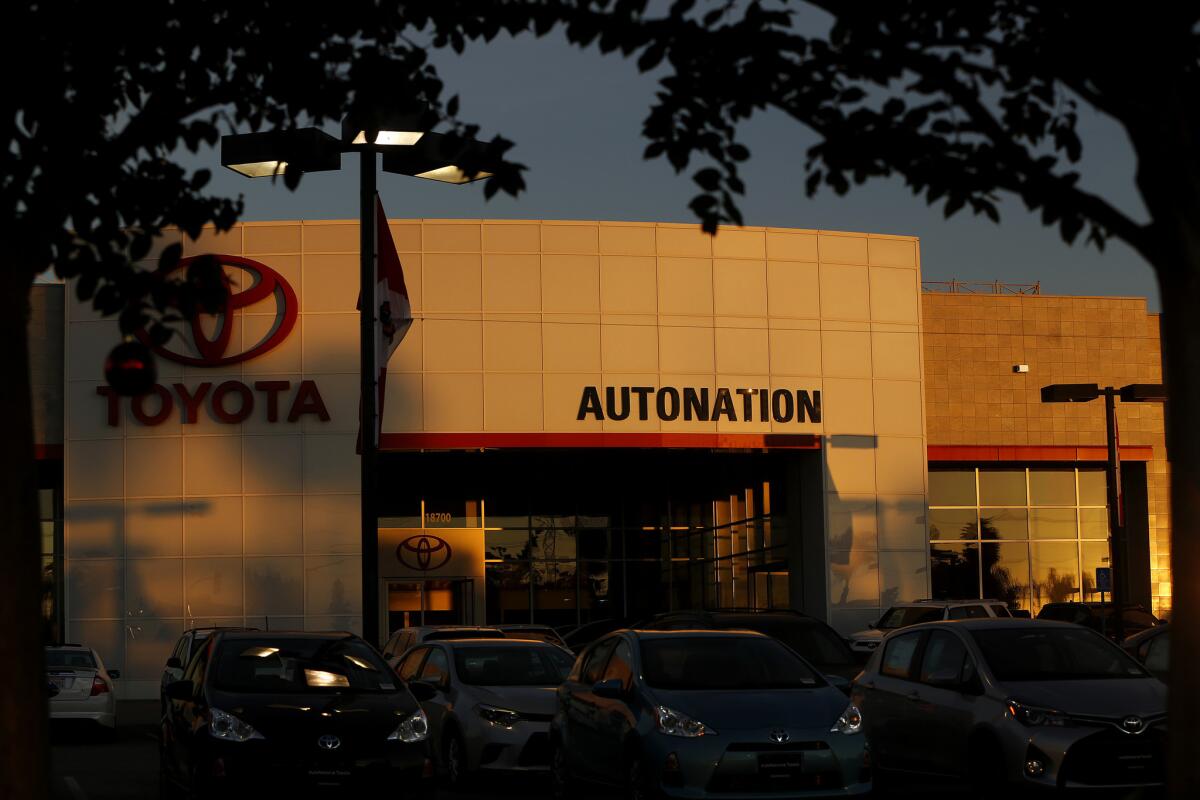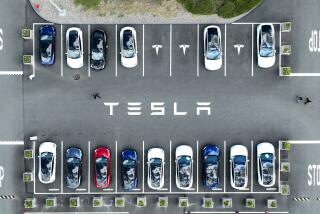Auto retailing ripe for disruption, industry executives say

New cars sit on the lot at AutoNation Toyota Cerritos on Dec. 8, 2014.
- Share via
Auto dealers must become digitally savvy and move to a model where consumers can purchase cars online.
That was the upshot of a conversation between Mike Jackson, chief executive of AutoNation, America’s largest dealer group, and Bob Carter, who heads Toyota’s sales in the U.S. They sat down with The Times last week at AutoNation’s Toyota store in Cerritos.
Is auto retailing ripe for change?
Jackson sees a disconnect between the way many dealers sell cars and how consumers shop in a digital age.
“When it comes to autos they feel like they have gone back a decade in time,” Jackson said. “We think there will be a great disruption in auto retailing.”
Car shopping should be a seamless experience with customers getting a high level of service regardless of whether they shop online or at the dealership, he said. The industry and regulations must change so that a buyer can start their research online, go to a dealer to test drive cars and return home to complete the transaction digitally.
AutoNation is taking the early steps toward that model with its SmartChoice Express service.
“The offspring of baby boomers have completely different retail expectations than their parents,” Carter said.
It’s not enough for Toyota to offer detailed information about its products on its Web pages.
“We need to take it to the next step,” Carter said. “We want to do business the way the consumers are doing business.”
Both executives said the industry is at the initial stages of an inevitable transition. “You either solve it yourself, or someone else will,” Jackson said.
Auto retailing is seeing a consolidation as larger companies buy up independent dealers and franchises. Will this continue?
Jackson predicts the auto dealer consolidation will continue at a slow pace because many dealerships are family businesses that are reluctant to sell out.
“We are buying their lifestyle,” Jackson said.
But there is a small but steady stream of families getting out of the business, he said. A decade ago, the top 100 auto retailers sold about 15% of the new vehicles in America. Now that’s about 20%.
One factor encouraging independent dealers to sell will be the cost of making the transition to a more digital sales model, Jackson said.
Carter added that the pace of consolidation is slowed by two factors.
First, auto retailing is a capital-intensive business, he said, and that limits entrants.
Second, the landscape is splintered over many different franchise owners. That limits the opportunity of a roll-up, with a large dealer network buying several smaller but sizable groups.
Some types of franchises are likely to remain independent. “In rural America, the single owner rooftops in small communities is a model that really works,” he said.
Automakers sold 16.5 million vehicles last year. Some analysts predict that will reach 18 million or higher in future years. What are your estimates?
Jackson said he is watching the rate at which cars are being sent to the scrap heap and how many new households are forming. He believes that adds up to a “sustainable” annual sales range of high in the 16 million to the low 17 million over the next three years.
“I don’t see a 19-million year,” Jackson said. “I am not sure the industry could produce that many cars for the U.S. market.”
But he doesn’t think the industry is headed for a slump.
Carter has similar estimates. He would be concerned if sales rose to about 18 million or higher.
“I hope that doesn’t happen,” Carter said.
That’s because cars are durable goods with years of useful life. Sales at the 18-million mark or above would likely steal business from future years, creating an eventual downturn.
Both executives noted that the industry is “solidly” profitable at current levels.
Some analysts believe transit services such as Uber and short-term rental companies such as Zipcar will erode auto sales. Are you concerned?
“These are interesting businesses and have their place,” Jackson said. “But they are very much at the margin.”
He said American consumers have a “love affair” with the automobile that’s unlikely to end because cars provide unfettered transportation freedom.
Carter had a more tempered view. He said in certain dense, urban markets, such as San Francisco, “we will see business models develop around access to cars but not ownership.”
Yet in others such as sprawling Southern California – with its long commutes and few centralized centers of employment – vehicle ownership will continue to drive the auto business.
Follow me on Twitter (@LATimesJerry), Facebook and Google+.







